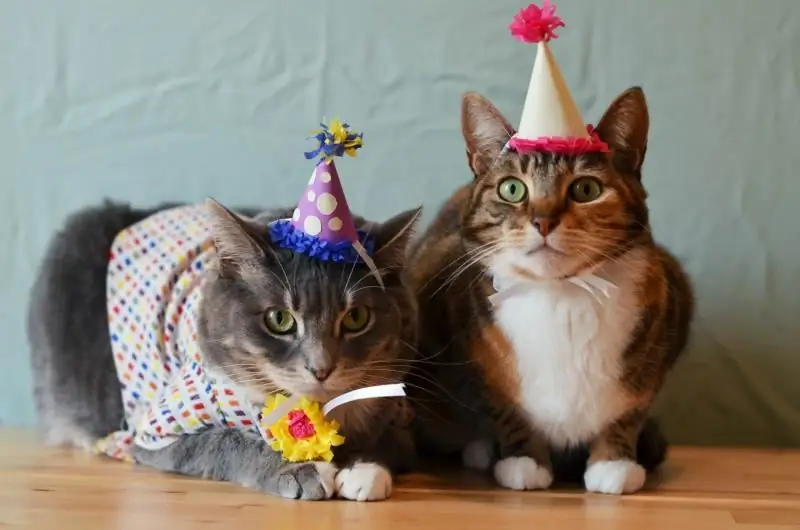
Table of contents:
- Author Bailey Albertson albertson@usefultipsdiy.com.
- Public 2023-12-17 12:53.
- Last modified 2025-06-01 07:32.
Top 6 long-lived cats and ways to join the ranks of record holders

Over the past decades, the average life span of cats has increased several times. This was facilitated by numerous studies of scientists and the availability of a large amount of information in the public domain, which allows owners to properly care for their pets. The secret of a long and happy life of an animal lies in the love and care of the owner. This can explain the fact that there is not a single yard cat in the rating of long-lived cats.
Content
- 1 Cat's lifespan
-
2 The age of a cat by human standards
2.1 Table: relationship with a person's age
-
3 Long-lived cats in history
- 3.1 Top 6 long-lived cats that hit the Guinness Book of Records
- 3.2 Russian record holders
- 3.3 Video: long-lived cat Fluff from Tatarstan
-
4 How to prolong the life of a pet
- 4.1 Does the breed matter?
- 4.2 Proper care and love of the owner
Life span of cats
Domestic cats live on average 12-18 years, outdoor cats only 5-8 years. Such a significant difference in life expectancy is due to the habitat. Outdoor animals are exposed to mortal hazards every day, including:
- attack from dogs;
- catching by flayers;
- poor quality food;
- infection with infectious diseases;
- getting injured and mutilated as a result of falls, fights with enemies;
- getting under the wheels of the car.
It is not uncommon for cats to become victims of inadequate people. It is for these reasons that yard cats live much less than their domestic relatives. Pets that never leave the house or apartment have every chance of becoming long-livers. They are protected from various external dangers, provided with everything necessary for a good life, surrounded by the care and attention of the owners.
Some owners occasionally let their pet cats go out for walks. From personal experience, I can say that such walks are extremely dangerous for pets. Unlike their street counterparts, they are not adapted to the environment, do not have an instant reaction and cannot objectively assess the impending risks. Careless behavior is often the cause of accidents and can be fatal.
In addition to the habitat, factors such as:
- genetics. Trying to breed purebred representatives of a certain breed, breeders mate close relatives with each other. This leads to the fact that kittens are born with a large number of hereditary diseases. Since this does not happen in their natural habitat, mongrel cats and half-breeds are considered the healthiest;
- diet. Complete and balanced food, which contains essential vitamins and minerals, prolongs the life of the animal. The consumption of cheap feed with a large amount of chemical elements and artificial substitutes, on the contrary, causes irreparable harm to the health of the pet;
- chronic diseases. With untimely treatment, a seemingly insignificant ailment turns into a chronic form and depletes the cat's body. Urolithiasis, diabetes mellitus, diseases of the upper respiratory tract significantly reduce the life of a cat.
- psychological microclimate in the family. If a pet is subjected to physical punishment, becomes a witness to constant quarrels and scandals between households, he plunges into a state of stress and anxiety. A bad emotional background becomes the cause of the development of serious diseases, which can be fatal;
- floor. Each pregnancy depletes the female's body, but despite this obvious fact, scientists have found that cats live 2-3 years more than cats. The fact is that males spend a lot of energy on conquering territory, fighting enemies, directly courting females;
- reproductive function. Sterilized animals live 3-4 years longer due to the absence of hormonal disruptions and stress associated with puberty, as well as a significant reduction in the risk of developing oncology. The average life span of spayed (neutered) pets is 15-20 years.
The age of a cat by human standards
For a long time, a simple method was used to calculate the age of a cat in human terms: one year of an animal's life was equated to 7 years of human life. This scheme gave quite interesting results:
- a one-year-old kitten was equated to a seven-year-old child;
- a two-year-old cat matched a fourteen-year-old teenager;
- The twelve-year-old cat was considered almost a century old.
In reality, this scheme does not allow us to correctly compare the stages of human and animal development. More correct is the scoring system using the match factor. This coefficient means the number of years lived by a person (taking into account the emotional sphere and social intelligence), which corresponds to one cat's year of life. The information received allows the owner to better understand the pet, to determine the stages of its growing up.
Table: relationship with a person's age
| Coefficient | Cat age | Human age |
| 6-7 | 1 month | 6-7 months |
| 8-8.6 | 3 months | 2 years |
| 28-30 | 6 months | 14-15 years old |
| 24-24.75 | 8 months | 16-16.5 years old |
| 18-19 | 1 year | 18-19 years old |
| 12-13 | 2 years | 25-26 years old |
| 10-11 | 3 years | 30-33 years old |
| 8.75-9.25 | 4 years | 35-37 years old |
| 8-8.6 | 5 years | 40-43 years old |
| 7.1-7.6 | 6 years | 43-46 years old |
| 6.4 | 7 years | 45-47 years old |
| 6.25-6.62 | 8 years | 50-53 years old |
| 6.1-6.4 | 9 years | 55-58 years old |
| 6-6.3 | 10 years | 60-63 years |
| 5.6-5.9 | 11 years | 62-65 years old |
| 5.4 | 12 years | 65-68 years old |
| 5.2-5.46 | 13 years old | 68-71 years |
| 5.1-5.2 | 14 years old | 72-73 years old |
| 4.9-5 | 15 years | 74-75 years old |
| 4.75-4.8 | 16 years | 76-77 years old |
| 4.5-4.6 | 17 years | 78-79 years old |
| 4.4-4.7 | 18 years | 80-85 years old |
| five | 20 years | 100 years |
It should be noted that this technique is the most objective and truthful, but does not guarantee reliable results. The thing is that the psyche of a cat is not arranged in the same way as a human, therefore, it is not worth taking a two-year-old pet as a fully formed personality.
Long-lived cats in history
Scientists have found that in recent years, the life expectancy of cats has increased significantly compared to previous centuries. The Guinness Book of Records annually replenishes its pages with new unique data. If at the beginning of the last century a 36-year-old cat named Puss (the first officially registered long-living cat) became a real sensation, today pets over 30 are far from uncommon.
The largest number of centenarians is found in the UK and the USA. Unfortunately, most of the famous fuzzies occupying the leading lines in the Guinness Book of Records are no longer alive today. However, they are being replaced by new centenarians. For example, in 2018, the title of the oldest cat was awarded to the record holder of the Maine Coon breed from the UK named Rubble (Rubble). He celebrated the 30th anniversary, which by human standards is comparable to the age of 137 years. It is possible that the cat will break the records of its predecessors. The whole world is closely following his life and wishes him to remain in good health for a long time.

Crushed Cat recently celebrated its 30th anniversary
Top 6 long-lived cats that hit the Guinness Book of Records
According to experts from the Guinness Book of Records, it is very difficult to fix a record for the longevity of an animal: the owners must provide the commission with video recordings, photographs confirming the age of the pet. Otherwise, the record will not be included in the Book. Therefore, it is quite possible that there are or have been older cats in the world that have not been officially awarded the title of centenarians.
To date, the rating of famous and world-famous cats includes the following record holders:
-
Lucy. The cat is originally from the UK, at the time of fixing the record she was 40 years old (about 172 years old by human standards). Despite the complete loss of sight, the long-liver was distinguished by energy and cheerfulness, she happily hunted mice in the master's garden.

Lucy 40-year-old Lucy's record has not yet been broken by any cat
-
Cream Puff. Together with her owner, Jake Perry, the 38-year-old record holder lived in the USA, Texas. By human standards, she was between 163-165 years old. The owner himself told reporters in an interview that the secret of his pet's longevity lies in a special diet, which is based on bacon, eggs, asparagus and broccoli. It is noteworthy that in addition to Cream Puff, Jake had another Sphynx cat named Granpa Rex Allen. He was also listed in the Guinness Book of Records, having lived for 34 years.

Cream Puff Long-liver cream Puff loved to feast on eggs and bacon
-
Nutmeg. Another cat from the UK who lived for 31 years (141 years by human standards). He died suddenly immediately after fixing the record. The owners drew attention to breathing difficulties, immediately took the pet to the hospital, but the doctors were powerless. The cause of death was acute heart failure.

Natmeg Long-liver Natmeg set a record on his birthday
-
Scooter. A cat from the United States was born back in 1984, died at the age of 30. According to the hostess Gail Floyd, he was distinguished by enviable energy. Unfortunately, health problems arose at the age of 28 when the cat broke his paw. After the accident, he was treated for a long time, but was never able to fully recover.

Scooter Scooter the cat loved to travel
-
Tiffany. The record for a cat from the United States was recorded when she was 26 years old. The owner recalls how she bought a pet at a pet store for $ 10. During her long life, the record holder took part in hundreds of fights, but she never received serious injuries. Until the end of her life, she retained excellent vision and hearing. She died at the age of 27 years and 2 months (about 125 years old by human standards).

Tiffany 27-year-old cat Tiffany was in good health until the end of her life
-
Velveteen. Like Tiffany, he was 26 years old. A fluffy handsome man lived in Oregon, in the countryside, spent a lot of time in the fresh air. Unfortunately, not so long ago, the hostess shocked the public with a note in her profile on the social network: “Velvet left home and never returned”. Until now, nothing is known about his fate.

Velveteen Velvet the cat went missing after entering the Guinness Book of Records
Record holders from Russia
According to the Russian Book of Records, the title of "Oldest Cat" officially belongs to Daniel Yankey from Moscow. At the time of registration (July 11, 2016) he was 22 years 15 days old. Whether he is alive today is unknown. A representative of a Thai breed named Smoke, who lives in Tyumen, claims a new record. Not so long ago he turned 25 (about 115-120 years old by human standards).

Smoke the cat claims to be the longest living cat in Russia
Among the unofficial long-lived cats, one can note the Dymka cat, which is more than 27 years old, as well as a 23-year-old cannon from Tatarstan.
Video: long-lived cat Fluff from Tatarstan
How to extend the life of a pet
Despite the average life span of a cat of 12-18 years, it is in the hands of the owner to increase this figure by 1.5-2 times. The key to success will be love, a sensitive and caring attitude towards the pet, as well as strict adherence to the rules and advice of veterinarians regarding the care and maintenance of a cat.
From personal observations, I can say that genetics is the main factor affecting the health and life expectancy of an animal. If the pet did not have centenarians in the genus, it is unlikely that it will be able to please the owners with its presence for a very long time (even in ideal keeping conditions). When choosing a kitten in the cattery, I recommend asking the breeders for information about the pedigree of the baby, possible hereditary diseases. This will allow you not to make a mistake in choosing and acquire a healthy pet.
Does breed matter?
The question of the influence of the breed on the lifespan of animals has long been the subject of numerous studies by scientists. There are still debates among specialists regarding this topic. Most breeders and veterinarians claim that members of the same breed have different lifespans due to individual characteristics of the organism and heredity.
However, scientists have identified several specific cat breeds that boast the most robust health and good immunity:
- siamese;
- Persian;
- Scottish fold;
- British;
- Bengali;
- Russians are blue;
- Maine Coons.
Most of the above representatives of the feline family, with proper care, cross the threshold of 20 years, however, each breed has negative nuances that the owner should know about. For example, the British have an excellent appetite and are prone to obesity, so to increase their lifespan, they should be limited in food. Maine Coons need regular physical activity and a spacious home (therefore, it is undesirable to start them in a cramped one-room apartment). Scottish Folds often have problems with the spine and ears, while Siamese have a predisposition to urolithiasis, renal failure, strabismus, and glaucoma. To avoid health problems, the pet should be regularly taken to the veterinarian for examination.

Representatives of the Maine Coon breed often become centenarians
The least viable are the Snow Shoe and the Bombay cat (the maximum lifespan is no more than 12 years), as well as the Scottish Straight, Ural Rex, American Bobtail, York Chocolate, exotic shorthair (live to 13-14 years). Abyssinians and Sphynxes delight their owners for an average of 15-16 years.

The beauty of snow shoo rarely crosses the 12-year line
Proper care and love of the owner
A long-lived cat can only be raised in love, care and affection. A sensitive and reverent attitude towards the pet on the part of the owner is the main guarantee of success. The animal, like a small child, catches the slightest fluctuations in the psychological microclimate of the family, feels any changes in human behavior. Since stress can negatively affect health, the owner should make every effort to provide a comfortable and supportive environment for the cat.
"All diseases from the nerves" - this phrase is suitable not only for people, but also for animals. I know many cases when an absolutely healthy cat suddenly lost its appetite, became apathetic or, conversely, aggressive, and soon became very ill just because the owner was absent for a long time and did not have the opportunity to pay enough attention to the pet. When purchasing a pet, you must clearly measure your strengths and capabilities, and be aware of the full responsibility of this decision. Remember that we are responsible for those we have tamed.
In addition to love and care, you should remember about simple rules for the care and maintenance of a cat, which contribute to an increase in its life expectancy:
- diet. Food should be complete and balanced, rich in essential micronutrients. It is advisable to purchase food that is appropriate for the age or breed of the cat (you should consult in advance on this issue with the breeder). The correct diet allows you to avoid problems with excess weight, helps to normalize digestion;
- physical activity. Active games with the owner help keep the animal in good physical shape, help to strengthen the general tone of the body. Larger breeds (eg Maine Coons) need regular walks in the fresh air;
- organization of leisure. The pet should be provided with a sufficient number of toys so that, in the absence of the owner, he has the opportunity to have fun and frolic on his own. Staying in an empty room worsens the mental state of the cat;
- hygiene procedures. Regular care of teeth, hair, prevention of fleas and worms are essential ingredients for excellent animal health;
- sterilization. If in the future it is not planned to obtain offspring from a pet, it should be sterilized or castrated in advance (before puberty). This operation will significantly prolong the life of the animal;
- a visit to the veterinarian. In addition to regular vaccinations, the cat needs to be taken from time to time for examination by a veterinarian. This will allow you to timely identify possible health problems. In case of visible deterioration (loss of appetite in the pet, lethargy, excessive nervousness, etc.), it is strongly recommended not to self-medicate, but immediately seek help from specialists.
If the cat does not eat food, but natural food, the owners should exclude pork (too fatty), boiled potatoes (starch is not absorbed), legumes (provoke bloating), fish (increases the risk of developing urolithiasis), bones (can damage food tract).
Despite the average life expectancy of 12-18 years, with proper care, cats can live up to 20 years, and in exceptional cases even double this figure. The basic rules of care, maintenance and creation of a favorable psychological microclimate in the family will help to extend the life of a pet. Love and affection from the owner are the secrets of the animal's longevity.
Recommended:
World Day Of Cats And Cats: When They Celebrate (August 8 Or March 1) In Russia And The World, History And Description Of The International Holiday
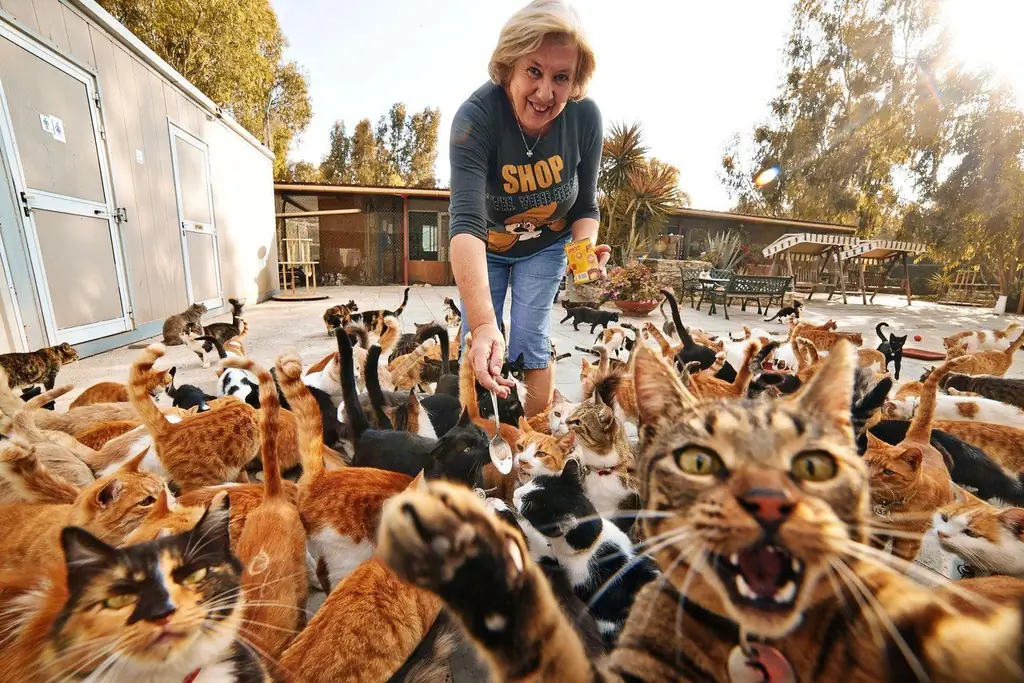
The history of the appearance of the day of cats. What days are celebrated in different countries of the world. How and with what attributes the holiday is celebrated in Russia and in the world. Interesting Facts
Life Hacks For Cats And Cats - Usefulness That Will Improve The Life Of Adult Pets And Kittens, Simplify Caring For Them And Ease The Life Of The Owners

How to make the life of a domestic cat better and more varied. How to arrange a place for a cat, a toilet, make toys and much more. Practical advice
How Many Years Do Cats And Cats Live: The Average Life Expectancy Of Animals In Domestic And Natural Conditions, What Affects It
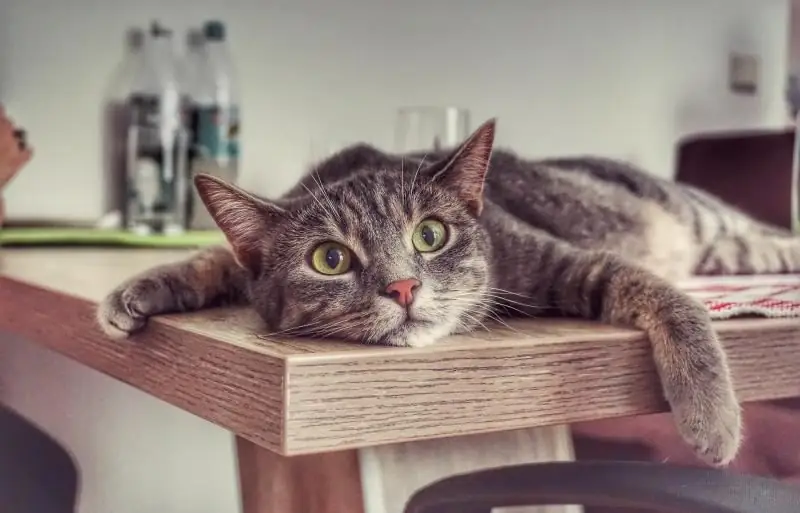
Biological and actual life span of cats. Factors that affect this indicator. Ways to make your pet's life longer and better. Reviews
The Fattest Domestic Cat In The World: Rating Of Fat Men, Reasons For The Overweight Of An Animal, Is Such A Feature Useful For Health, Photo
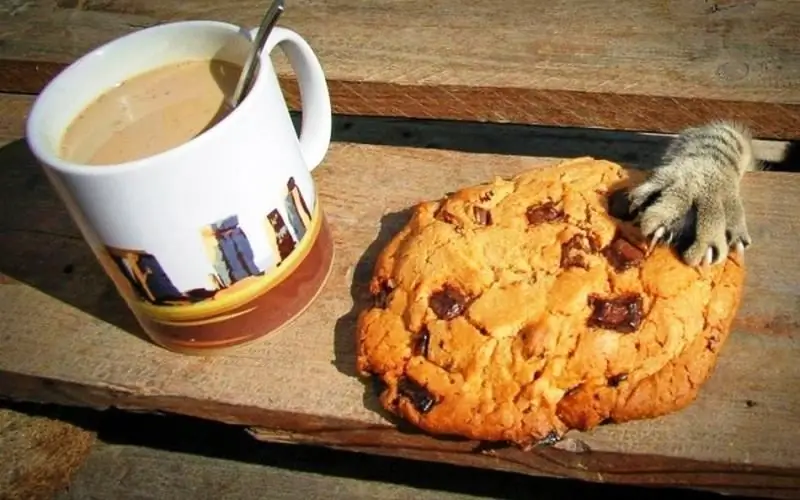
Which cats are recognized as the fattest in the world. How to diagnose obesity yourself. Its causes and consequences. How to help your cat lose weight
The Kindest And Most Affectionate Cat Breeds: The Advantages And Disadvantages Of Such Animals, Features Of Choosing A Pet, Photos
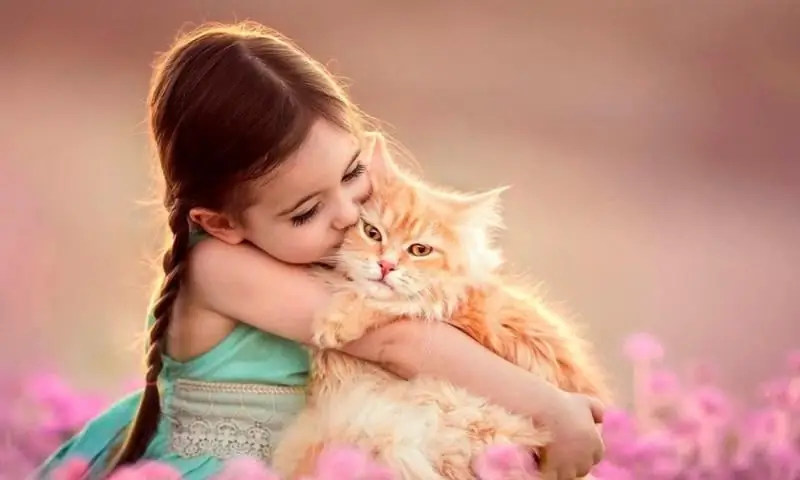
Why affectionate cats are the most popular. Disadvantages of such breeds. Varieties of affectionate cats and their description. The kindest cat in the world. How to choose a cat
